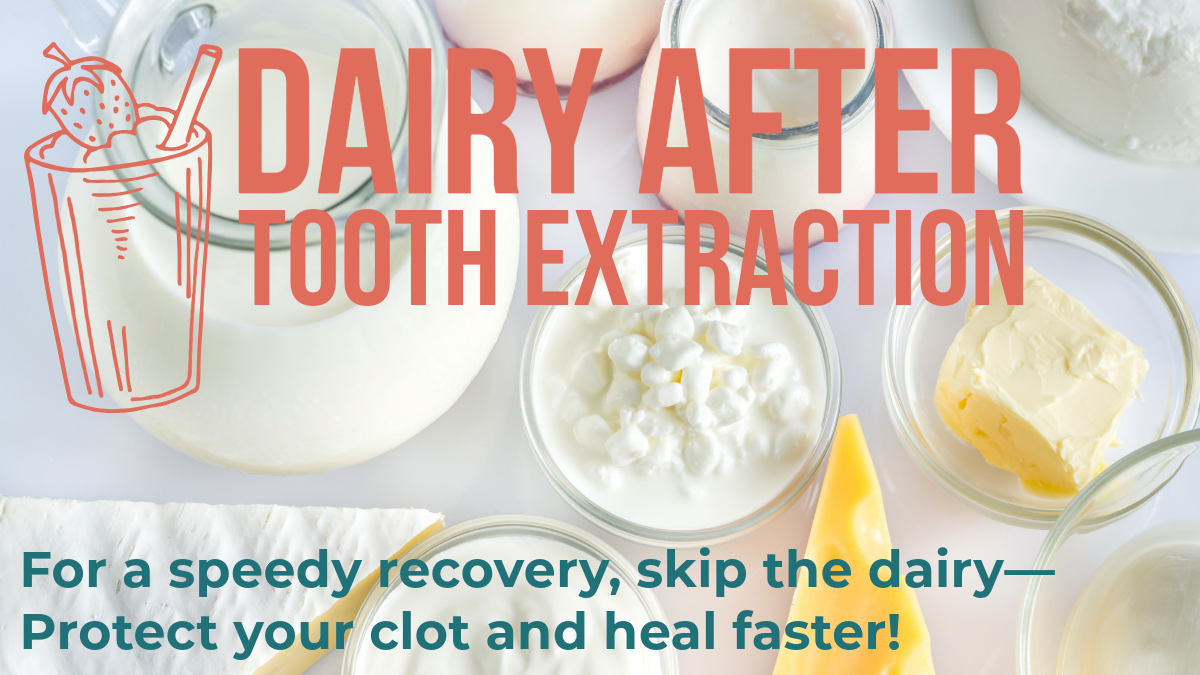
Extraction, in its simplest form, is loosening the tooth from its jawbone and then pulling it out using a specialised tool. Following a tooth extraction, a hole will develop in the gum tissue around the tooth's root; this region must recover and the incision must close.
Blood clot formation in the tooth extraction cavity creates an environment favourable to the healing of bone and soft tissues. An unpleasant condition called "dry socket" and a slowed healing rate might result when this clot breaks free. Therefore, after having a tooth extracted, patients are given safe food options to help them heal faster and reduce the risk of infection.
At this point, particular advisories against the intake of dairy products emerge. Nevertheless, the scientific community has not achieved unanimity on the matter. Thanks to the advice of German dentists, this issue is also beginning to garner some attention.
How healing works post-extraction
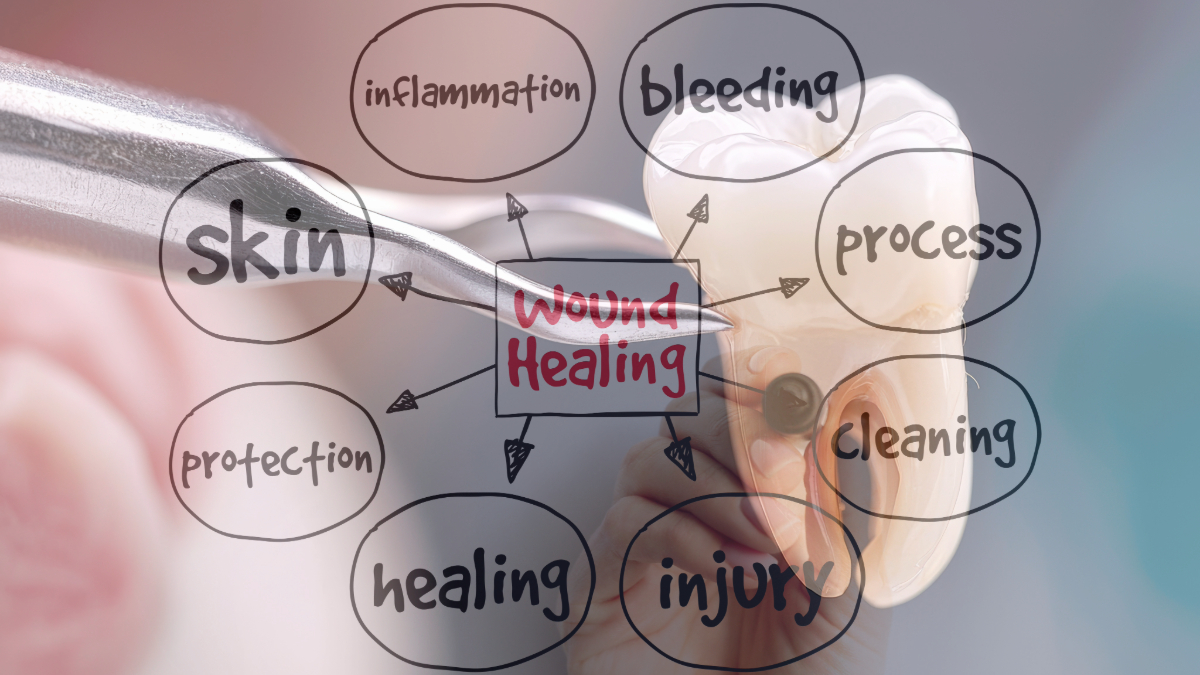
Blood clots play an essential part in the recovery process following tooth extraction. After a tooth is extracted, a blood clot forms in the socket. This clot prevents infection at the incision site and lays the foundation for new bone and soft tissue to grow. Removing this clot might postpone the healing process. Hence, post-extraction care must prioritise clot protection.
Possible causes of the blood clot dislodging include:
- Spitting and mouth rinsing: Spitting and vigorous mouth rinsing, especially in the first 24 hours, can dislodge the clot.
- Using a straw: Drinking through a straw can create negative pressure in the mouth, which can cause the clot to dislodge.
- Smoking: Smoking slows healing by introducing bacteria to the wound site and can also dislodge the clot by suction.
- Eating hard or sticky foods: Hard and sticky foods that can get stuck in the extraction site or pull the clot should be avoided.
- Gargling: Gargling in the first 24 hours can dislodge the clot.
Recovery Process and Timeline:
- First 24 hours: During this time, it is important that a blood clot forms and the wound site is protected. It is recommended to refrain from gummi-pulling, spitting, smoking, and to eat soft, cold foods instead.
- 2-3 days: Swelling may increase during this period and can be kept under control with painkillers. After the first 24 hours, you can start gargling with slightly warm salt water.
- 4-7 days: The swelling starts to decrease and the wound area gradually heals. Keep eating soft foods and be careful not to put any pressure on the extraction site while this is happening.
- 2 weeks: The gums heal completely. It is important to pay attention to oral hygiene during this period.
- 4 months: New bone formation is complete and the wound area is completely healed.
Why Dentists Often Advise to Avoid Dairy
The reasons why dentists typically advise against consuming dairy products following tooth extraction are as follows:
Potential for Infection and Bacterial Contamination
- Dairy products can support bacterial development. This increases infection risk, especially with poor dental hygiene.
- Proteins in dairy products can promote bacterial growth, causing gum swelling and pain.
Dairy products can increase the risk of infection by providing a favourable environment for bacteria to grow in the mouth. Proteins in dairy products also increase the risk of infection by promoting bacterial growth. Signs of infection, such as swelling, severe pain, or bad odour or taste, may indicate that an infection has developed at the wound site.
Potential for Residue and Abscess Formation:
- Milk products can create a thick, sticky film in the mouth. This residue might irritate the extraction site and slow recovery.
- Milk residue may promote bacterial colonies at the wound site and slow healing.
The lactose in milk may give bacteria a good place to grow, increasing the possibility that an abscess will form at the extraction site.
Risk of "Dry Socket" (Alveolitis):
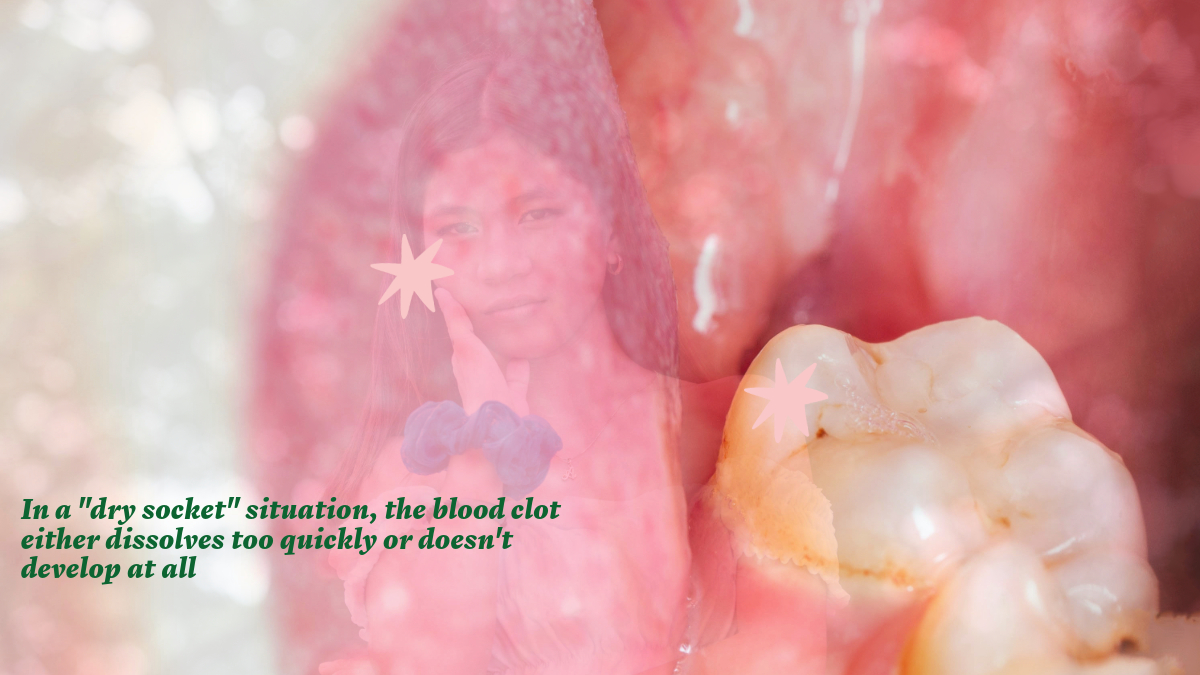
Dairy products do not induce dry socket in and of themselves, but they can raise the possibility of clot irritation or dislodging. The risk of getting trapped in the extraction site increases with granular dairy products like cheese. In a "dry socket" situation, the blood clot either dissolves too quickly or doesn't develop at all. As a result, the wound site may become inflamed, painful, and even expose bone.
Temperature Sensitivity:
Although cold dairy items, like ice cream, may provide temporary relief, they actually irritate newly exposed nerves.
Lactose Intolerance:
Milk allergy or lactose intolerance might affect certain persons. Additionally, some medications may have an adverse reaction to dairy products. It has been found that certain antibiotics, like quinolones and tetracycline, can have their efficiency diminished when taken with dairy products. Nevertheless, following a tooth extraction, these antibiotics should not be used.
Claims regarding dairy products:
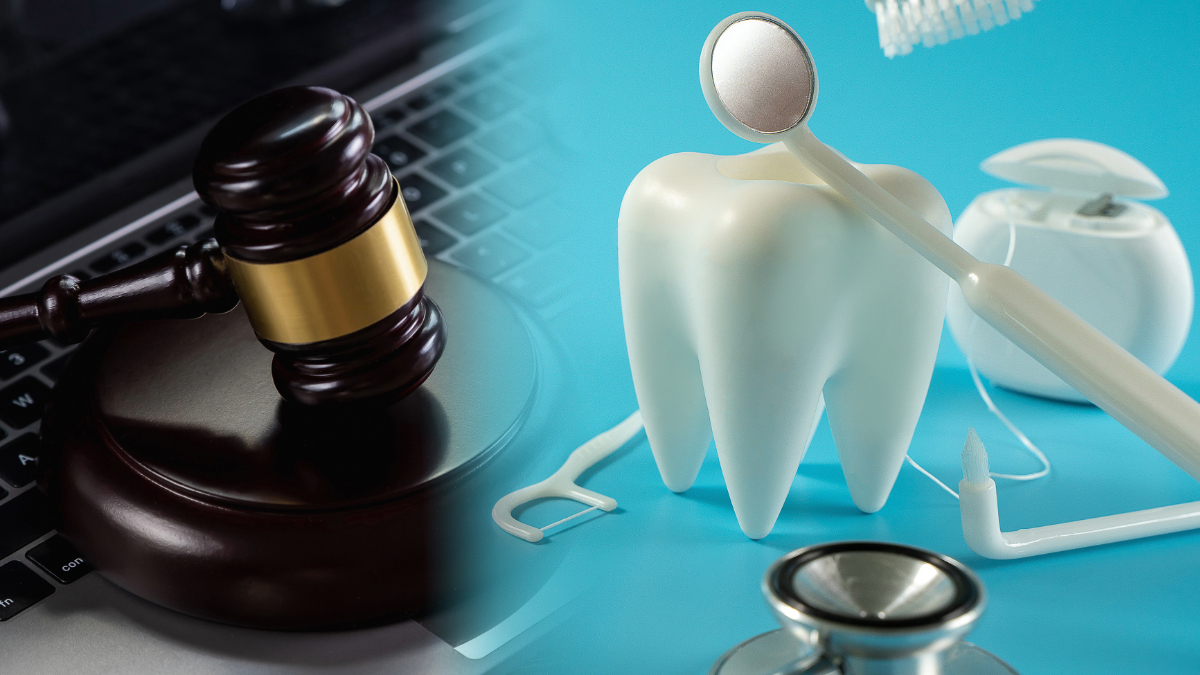
- There is some concern that lactic acid bacteria in dairy products may impair wound healing, but there is no scientific evidence for this.
- There are also concerns that dairy products may adversely affect blood clotting, but there is insufficient evidence for this.
- A study from 2022 found that there is no evidence that dairy products should not be consumed after tooth extraction. This recommendation was found to be more common in German-speaking countries.
- Dairy products may reduce the effectiveness of antibiotics (such as Tetracycline and Quinolones). However, these are not usually the first choice antibiotics used after tooth extraction.
- Dairy products may be thought to increase the risk of tuberculosis at the wound site. However, this risk is very low due to the pasteurization and UHT (ultra high temperature) treatment of the milk we use today.
Recommended Foods and Alternatives
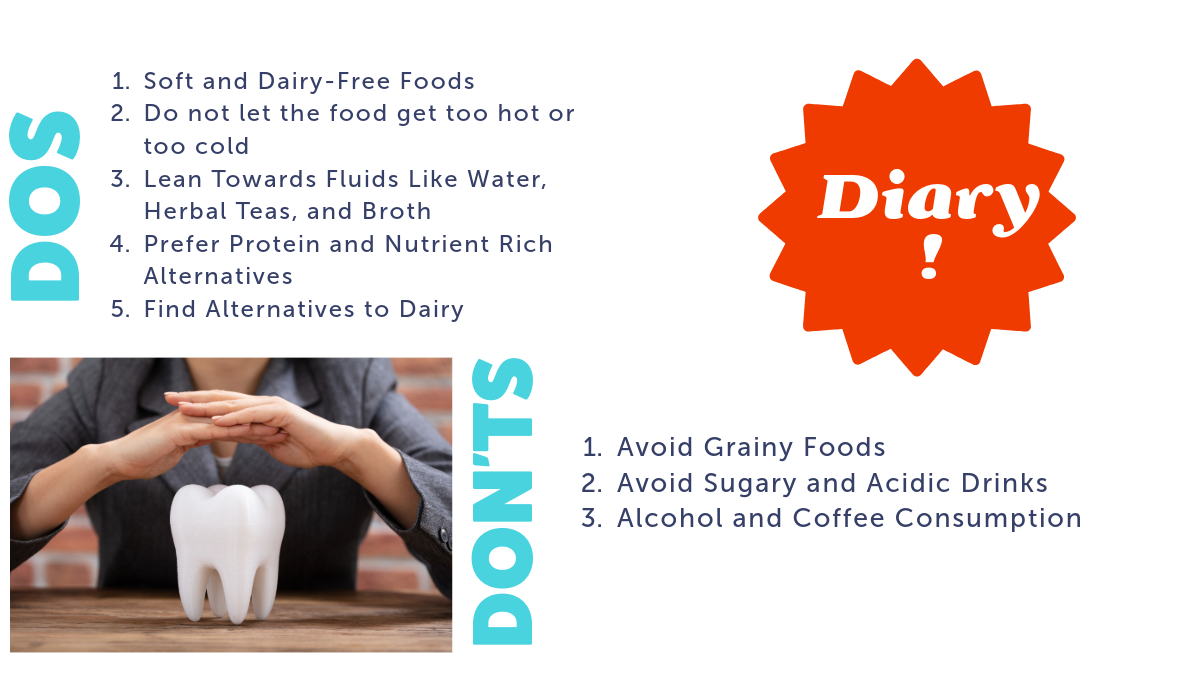
For the first several days following a tooth extraction, extreme caution is necessary. To speed up the healing process after a tooth extraction, avoid eating solid foods or dairy for at least two to four hours. Some considerations to keep in mind following a tooth extraction are as follows:
Dos
Soft and Dairy-Free Foods:
At this time, it's best to stick to soft foods like oatmeal, applesauce, mashed potatoes, scrambled eggs, dairy-free smoothies and hot soups. This type of food makes it easier to recover by reducing the amount of chewing required, as well as by avoiding pressure on the affected area.
Do not let the food get too hot or too cold:
Foods that are too hot or too cold can irritate delicate gums and nerves, so it's best to avoid them. Wounds are less likely to sustain further harm when food is kept at a steady temperature.
Lean Towards Fluids Like Water, Herbal Teas, and Broth:
To keep the body's water balance, drink plenty of water, herbal teas, or chicken broth. These fluids keep you hydrated without irritating your wound, which speeds up the healing process. Because of their all-natural composition, herbal teas in particular can be calming and restorative.
Protein and Nutrient Rich Alternatives:
Scrambled eggs, baked beans, soft tofu, salmon, and other protein-rich foods are excellent substitutes that can aid in tissue healing. Consuming sufficient protein supplies the body with the nutrition it needs to repair damaged tissues.
Alternatives to Dairy:
Vegan milkshakes and smoothies are a wonderful substitute for dairy goods if you're supposed to stay away from them after getting your teeth extracted. You can't go wrong with the tasty and healthy plant milks like almond, soy, and cashew. A more varied diet that includes grain-free, cold soups or purees instead of yoghurt can help supply more of the nutrients the body needs.
Don'ts
Avoid Grainy Foods:
You should stay away from cereals as well. Foods high in grain, like rice or tiny seeds, can impede healing at the extraction site. Ingesting certain foods can slow healing and increase the likelihood of infection in wounds.
Avoid sugary and acidic drinks:
Having said that, stay away from acidic or sugary beverages. In fact, these beverages could aggravate already-vulnerable gums and teeth. In addition to slowing the healing process, acidic beverages can irritate the wound site and make it worse.
Alcohol and Coffee Consumption:
Additionally, after getting your teeth extracted, you should avoid drinking coffee and alcohol. A number of factors, including alcohol, can hasten bleeding and limit the rate of healing. Always keep in mind that drinking too much alcohol might throw off your body's water balance and lead to dehydration. However, the caffeine in coffee has the potential to increase blood pressure and make you more prone to bleeding accidents.
Detailed FAQ
For all your questions about what to do with dairy after tooth extraction, we have compiled an exhaustive list below.
Why do dentists recommend avoiding dairy products?
Dairy products can provide a favorable environment for bacteria to grow, which can increase the risk of infection. This is especially important in the sensitive mouth area after tooth extraction. In addition, dairy products can increase inflammation in some people, which can negatively affect the healing process.
Is it Safe to Eat Yogurt?
As a result of the probiotics it contains, yoghurt aids digestion and may even strengthen immunity. Yoghurt, on the other hand, can be problematic at the extraction site because to its graininess and the possibility of residue. Sugar, which is present in some yoghurts, can also promote the growth of bacteria. After the first two to three days following extraction, yoghurt can be taken with discretion. Gently rinsing your mouth with water after ingestion is recommended.
Is it safe to consume cheese and other dairy solids?
Sticky or gummy solid dairy items, in particular, can irritate the extraction site and trap tiny particles in the wound region, making the extraction process more painful. For that reason, you should abstain from eating those things for a bit. There is an increased risk of infection at the extraction site due to the microscopic particles that cheese can leave behind.
Can Dairy Products Cause Dry Socket?
When a blood clot breaks loose, dissolves too quickly, or doesn't develop at all, it causes dry socket, also known as alveolitis. While the sticky and thick viscosity of dairy products may not directly promote dry socket, they can contribute to the dislodging of blood clots. The likelihood of dry socket is also higher in people who smoke, spit hard, use straws to drink and have poor dental care.
When can I go back to dairy products?
Once the first few days have gone and the extraction site has begun to heal, it is usually safe to consume dairy products. But to find out when it's ideal, you should see your dentist. After seeing your recovery progress, your dentist will provide you with tailored advice.
Are dairy-based protein shakes or smoothies okay?
When you're healing from a tooth extraction, it's important to avoid dairy products like proteinshakes and smoothies. Some people have trouble swallowing solids, but those who want to get all the nutrients they need can benefit from liquid nourishment. Still, liquids that are excessively hot or too cold could trigger sensitisation, so it's best to eat smoothies and shakes warm or at room temperature.
What if I have lactose intolerance or a dairy allergy?
While healing from a tooth extraction, people who are lactose intolerant or have a dairy allergy should avoid dairy products in favour of plant-based alternatives. If you're looking for a dairy-free milk substitute that still contains calcium and other nutrients, try making your smoothies and shakes with almond, soy, cashew, or coconut milk. Good calcium sources include leafy greens, tofu, fish with bones, and vegetable milks that are fortified with calcium.
Could ice cream help with swelling or pain relief?
Because of its cooling impact, ice cream can temporarily alleviate pain and oedema following a tooth extraction. But it can raise the risk of infection because of the sugar it contains, which can encourage the growth of bacteria. Foods that are excessively chilly might also make the area more sensitive and possibly break the blood clot.
I need calcium for bone health-how can I get it without dairy?
There are various sources of calcium that you can choose instead of dairy products. Leafy greens, calcium-fortified vegetable milks, fish with bones and tofu are good sources of calcium. Foods such as oranges, figs, legumes, sesame seeds and almonds can also contribute to calcium intake.
In addition to calcium intake, it is important to follow a balanced and varied diet during recovery. Consuming protein sources such as eggs, tofu, legumes and lean meats is essential for bone regeneration. Vitamin C, vitamin D and vitamin K are also important for bone health and healing.
Is it okay to rinse my mouth after eating dairy?
In the days following a tooth extraction, it is recommended to rinse your mouth gently with water to remove any remnants of dairy items. To keep the blood clot at the extraction site in place, you should not spit or rinse too vigorously. While you're trying to heal, stay away from straws since they can cause suction, which can break up the blood clot.
Saliva or antibacterial mouthwashes may be suggested by your dentist. Rinse your mouth gently with salt water after the first day, but don't do it too often.
Should I call my dentist if I accidentally consumed dairy too soon?
You don't need to rush to the emergency room if you accidentally eat dairy products after getting your teeth extracted. A scientific experiment carried out in 2022 further proved this. Those who ate dairy products following tooth extraction did not fare any better than those who did not, according to the research. Dairy products should not be consumed due to the potential risks involved.
Conclusion
Consequently, during the healing phase following tooth extraction, it is crucial to be careful and avoid disturbing the clot. This is why, particularly in the initial few days, you should stick to a soft, liquid, or pureed meal diet and avoid making any decisions that can put tension on the injured area. A quick recovery is within reach if you cut out dairy products and anything else that can break up blood clots or promote the growth of bacteria. Slowly reintroduce these meals when you're ready and your dentist gives you the green light.
You can further reduce the likelihood of complications by maintaining good oral hygiene, not using strong mouthwashes for the first several days, and consistently following your dentist's advice. Keep in mind that seeing your dentist promptly in the event of any unexplained pain, swelling, or foul odour will alleviate your concerns and help you maintain good oral health across time. For a healthier smile, it's important to keep all of your dental appointments and to follow your dentist's recommendations to the letter.
Resource:
Seyedi Moghaddam S, Neff A. Avoidance of milk and dairy products after oral surgery-is such a recommendation still valid? A cross-sectional study among German and international oral and maxillofacial surgeons and dental practitioners with review of the literature. Oral Maxillofac Surg. 2022 Dec;26(4):563-573. doi: 10.1007/s10006-021-01017-y. Epub 2021 Oct 25. PMID: 34694519; PMCID: PMC9643201.
